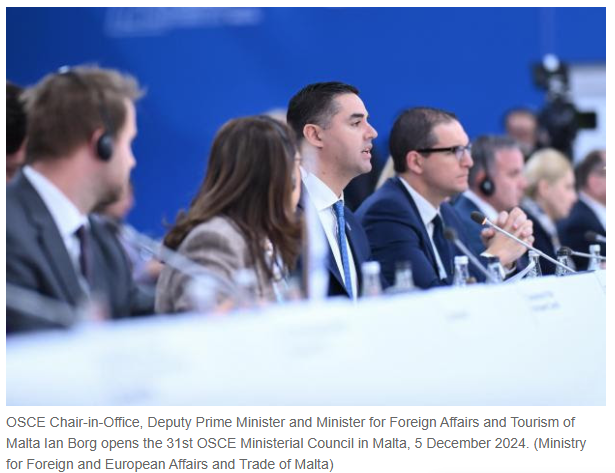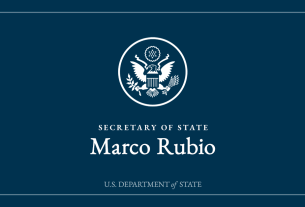VALLETTA, 5 December 2024 – As global conflicts and crises continue to shape the geopolitical landscape, the Chair-in-Office of the Organization for Security and Co-operation in Europe (OSCE), Malta’s Deputy Prime Minister and Minister for Foreign Affairs Ian Borg, opened the 31st OSCE Ministerial Council today, underscoring the critical role of the OSCE in facilitating communication and diplomacy.
In his address to the foreign ministers, state secretaries, and high-level officials representing 57 OSCE participating States and 11 Partners for Co-operation, Borg emphasized the organization’s indispensable role as one of the last open channels for dialogue in Europe, especially amidst the ongoing war in Ukraine and other regional security threats.
“The OSCE is needed more than ever, particularly in these times of war and multiple crises,” Borg stated. “Diplomacy and political will are our best tools to resolve the pressing security challenges in the region. This Ministerial Council provides us with a vital opportunity to both address current threats and strengthen our commitments toward a safer, more cooperative future.”
Borg reflected on the year of the Maltese Chairpersonship, guided by the theme “Strengthening Resilience, Enhancing Security.” He highlighted Malta’s focus on the conflict in Ukraine, using the OSCE’s mechanisms to alleviate its humanitarian impact, while working to ensure the resilience of the organization. This included negotiations aimed at maintaining the OSCE’s functionality and its adaptability in confronting new and emerging threats, as well as promoting gender equality and enhancing youth participation in global security efforts.
The Maltese Chairpersonship has been marked by a challenging year, as Borg acknowledged the difficult task of navigating the OSCE through such turbulent times. He reminded participating States of their collective responsibility in maintaining the organization’s relevance, urging them to ensure it is properly resourced and agile enough to meet the evolving security challenges of the future.
“For the OSCE to endure and continue to serve our communities, it must remain functional,” Borg said. “It is our collective duty to provide the necessary resources, leadership, and flexibility for the OSCE, its field operations, and institutions to fulfill their mandates.”
Pia Kauma, President of the OSCE Parliamentary Assembly and a Finnish MP, echoed the sentiment, noting the importance of dialogue in fostering understanding and lasting peace. “As we approach the 50th anniversary of the Helsinki Final Act, it is essential that we renew our commitment to dialogue, justice, and the shared principles that guide us,” Kauma said. “Only through genuine efforts to understand all perspectives, while remaining anchored in our shared values, can we build a durable path to peace.”
The Ministerial Council, which will conclude on 6 December, marks a significant moment in OSCE history, as Malta prepares to hand over the Chairpersonship to Finland at the end of the month. Finland will assume leadership of the OSCE in 2025, the year marking the 50th anniversary of the Helsinki Final Act, the OSCE’s foundational document.
As the OSCE looks ahead, the outcomes of the Ministerial Council will be closely followed, with updates shared via the organization’s official website and social media platforms.



